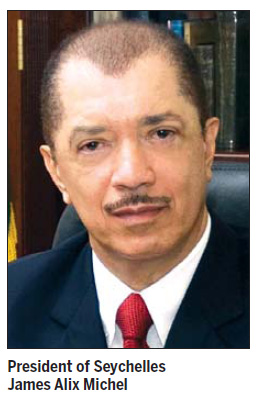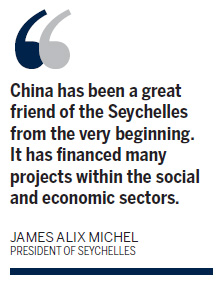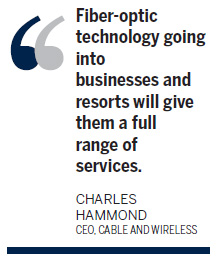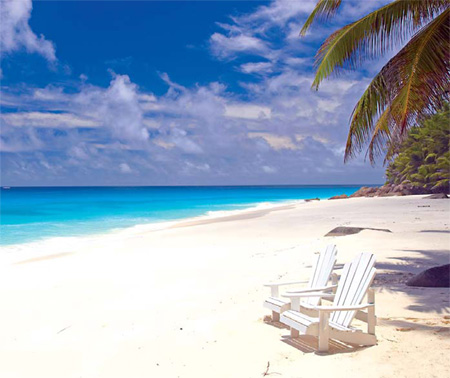News
Indian Ocean paradise exceeds IMF expectations
(China Daily)
Updated: 2011-03-28 07:59
 |
Large Medium Small |
|
Pristine, white-sand beaches and cool, turquoise waters are Seychelles' trademarks. Photos Provided to China Daily |

Strategically positioned and well connected, Seychelles is riding the crest of a wave
A beautiful group of islands in the Indian Ocean, the Seychelles has undergone a series of IMF-supported structural reforms since 2008 that have transformed the economy and contributed to a stable landscape, where citizens enjoy a high per capita income, as well as good health care and education, and a place tourists return to year after year in their thousands to enjoy pristine beaches and excellent accommodations.
Flanked by tourism, fishing and a growing financial sector, the African country is becoming a promised land for investors, as new legislation creates clear advantages and incentives for those wishing to do business from a pivotal position at the crossroads of Africa and Asia.
Growth reached 6 percent last year, exceeding IMF prediction by 4 percent, while widespread liberalization has resulted in government agencies across the board fully open to public private partnerships (PPPs), and fostered innovation and entrepreneurship among the people, resulting in increased employment.
The Seychelles also benefits from its excellent trade links; it became a free trade area in 2000, a customs union in 2009, and is a member of regional trading body COMESA, whose members include Kenya, Egypt and Tanzania.
It does, however, aspire to establish a monetary union by 2015, and continues to raise its profile considerably in the global arena. The proactive Seychellois President James Alix Michel - who has led the country since 2004 and headed the Seychelles' People's United Party for four decades - played an integral role in the setting up of the Indian Ocean Commission (IOC) to represent the interests of Africa's island nations.
As he explains: "The Seychelles has everything to gain from being a member of COMESA and has therefore been very active in that group of countries with regards to participating in all the decisions and agreements and acceding to various conventions.
"We have, however, been outspoken in making sure the other members understand that where there are projects being funded on the continent, they also need to consider the small island states that are still part of Africa.
Because if the EU or China decide to fund a railway in Africa, or build a dam to produce energy within the COMESA group, it will not benefit the Seychelles, Mauritius or Madagascar. Through the IOC, we have a stronger voice."
Strengthened links

As Africa/China relations gain momentum - trade between COMESA and China has grown by more than 50 percent since 2007 - the President is optimistic about the role the Asian powerhouse can play in the Seychelles.
"China has been a great friend of the Seychelles from the very beginning. It has financed many projects within the social and economic sectors. More recently, it built two primary schools and is about to start building another. China built our national assembly, the polytechnic, and a swimming pool, and is building the new courthouse.
"When President Hu Jintao visited two years ago, it created a new impetus between our countries. We have a privileged partnership with China that has gone a long way to help us in our socioeconomic development. China works with action; once the decision is made, they go ahead and do it. I like things to move fast, and China understands this.
On top of that, the Seychelles can be a very important stepping stone for investment into mainland Africa. We are small and beautiful, with good infrastructure and communications. We also have a good offshore financial sector that is recognized by the OECD as being a clean jurisdiction. China can make use of this and we have one of the best double taxation agreements.
"Of course we have other areas for investment, like fishing - we have a huge tuna processing factory that is operated by an international company MW Brands, and an exclusive economic zone of more than 1.3 million square meters that contains one the largest tuna catchment areas on earth, particularly yellow finned tuna. Tourism also provides huge possibilities across the sector."
There is also the prospect of oil. In 2005, US firm PetroQuest was granted exploration rights to around 30,000 sq km around the Constant, Tropez, Farguhar and Coetivy Islands until 2015, and various other US companies more recently. East African Exploration and Avana Petroleum also have interests.
Sustaining growth
Minister of Investment, Natural Resources and Industry, Peter Sinon, who studied development studies at a British university and is a former executive director of the African Development Bank, takes up the story.
"This ministry is a new wine in an old bottle: Half of it is new, for example, the investment part, while natural resources and industry existed before. I aim to showcase the Seychelles as an investment destination, and improve our business climate.
"We have reached the point of agreeing that the private sector should drive growth; the business of government now focuses on regulating and monitoring the business environment.
"We focus on sustaining and improving growth. We have made ourselves attractive to investment, not just foreign investment, but locally too. People here have more confidence because the banks can give them the foreign exchange, and because inflation has stabilized. Seychelles has become the place that is ready for business.
"My job is not only to find foreign investors, but to inform our entrepreneurs that they must get ready to partner, get ready to take advantage and be good suppliers for businesses that will become new pieces in the value chain."
To those who have suggested that the Seychelles is "in the middle of nowhere", the jovial minister has this to say: "I cannot be in the middle of nowhere because the day I am is the day I do nothing about the fact that I am in the middle of nowhereI am in the middle of everywhere, and the people will go there because I am going to sit and think of the reasons and incentives as to why the people should go there!"
Improved communications

The Seychelles is linked to the rest of the world by air and sea, and, since it was privatized in 2005, the airport has undergone a number of upgrades and expansions to serve the growing list of airlines using the islands for cargo and tourism transit.
Emirates and Qatar began flying to the Seychelles a year ago, which has stimulated tourism from the Middle East; since autumn 2010, Emirates operates seven flights a week from Dubai.
Air Seychelles, the national carrier, is working hard to keep up with the competition. Gilbert Faure, CEO of the Seychelles Civil Aviation Authority, said: "We need outside help through PPPs to build more runways because we won't be able to raise the money overnight, although we can fund the operational costs."
In terms of telecommunications, the country works to international standards and will soon benefit from a vast submarine cable connection to Tanzania that will deliver high-speed direct access to a fiber-optic backbone for the first time, allowing affordable Internet access and new broadband connections.
According to the leading telco, Cable and Wireless, which partners Airtel on the Alcent Lucent fiber-optic project and has been on the island for decades, it will change the way it does business.
"Initially we will still claw back the expense from the cable, and it will be expensive to go through the east coast of Africa, but bandwidth prices are coming down all the time. Capacity is being taken up very rapidly," said CEO Charles Hammond.
"To meet those challenges, we are thinking far ahead. We are spending a lot of money replacing the analogous network, which means there will be no returns for the shareholders for a few years,
"However, in the future we will be able to deliver 20 megabytes to each home. Fiber-optic going into businesses and the large resorts will mean they can have the full range of services.
"We have been preparing for this for some time so there will be minimal disruption; on Mah, for example, we have three rings interconnected with huge routers that will ensure there will be no disruption to service."
(China Daily 03/28/2011 page6)
| 分享按钮 |
